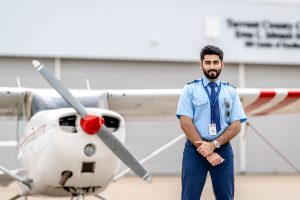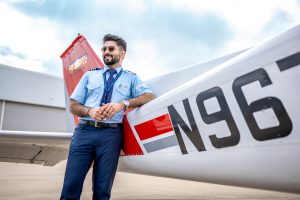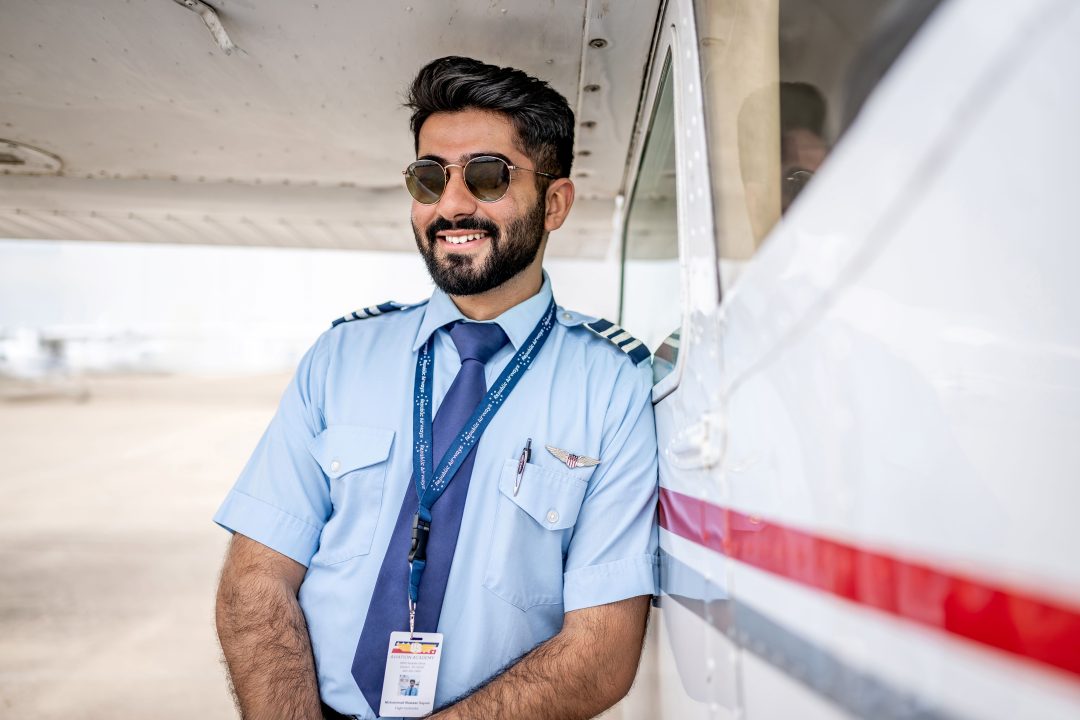Mohammad Nawaaz Nazim Sayani ’22 is racking up the flying hours — more than 450 in Cessna 152s and 172s as a flight instructor II for Denton-based U.S. Aviation. With each time aloft, he moves a step closer to sitting in the cockpit of an airliner for one of the major carriers.
That’s his dream job.
Sayani, 24, earned his Professional Pilot Associate of Applied Science from Tarrant County College and now provides flight and ground training to aspiring pilots. He explained the power of a supportive environment, how TCC has improved his life and why flying is safer than driving.
Tell me about growing up in India and how it influenced you.
Growing up in Mumbai meant growing up with contrast — tight spaces but big dreams, crowded streets but endless opportunity. I lived in a colony where community mattered. Everyone knew each other, and stories were always being shared. It was in that environment that I learned to observe, to listen and to dream beyond what was immediately in front of me.
Mumbai gave me grit. It taught me how to hustle, how to navigate uncertainty and how to connect with people from all walks of life. That ability to step into unfamiliar spaces, ask the right questions and build connections is something I carry with me in aviation every day.

What was your inspiration for becoming a pilot?
Growing up in a colony filled with pilots, I would see them regularly stepping into shiny corporate cars and wearing those sharp, perfectly ironed white uniforms with gold stripes. I didn’t know exactly what they did, but something about the way they carried themselves — the professionalism, the confidence — sparked my curiosity. I started asking questions, doing my own research, and little by little, I realized that being a pilot wasn’t just a job, it was a lifestyle that required discipline, focus and a love for adventure.
Coming from a business-oriented family, no one around me had ever explored aviation. I didn’t have a blueprint to follow — I had to figure everything out on my own. But I think that’s what fueled my passion even more. I’ve always been the kind of person who seeks new paths, who’s not afraid to talk to strangers or ask questions. That mindset helped me break into this industry and keeps me growing within it.
At the heart of it, I just love flying. The first time I stepped into a cockpit, I knew this was exactly where I belonged. It combined everything I loved — precision, responsibility, freedom and challenge.
What’s your favorite plane to fly?
The Cessna 172. It’s the one that saw me through my first solo, my first cross-country and, let’s be honest, a few not-so-great landings. It’s like the best kind of coach: straightforward and tough when it needs to be but always rooting for you to get better. Flying a 172 doesn’t come with luxury or autopilot, but it gives you something far more valuable — a solid foundation. It forces you to fly the plane and truly understand the basics, and that’s what makes it special.
Now if we’re talking dream aircraft — that’s the Airbus A350. It’s not just a plane. The A350 represents progress in every sense — fuel efficiency, environmental responsibility, passenger comfort and cutting-edge cockpit technology. It’s sleek, smart and built for the future. It embodies the kind of professionalism and precision I strive for.
You came to the U.S. to become a pilot. How did you end up at TCC?
I left everything behind in India with that one goal. I started my flight training at U.S. Aviation Academy, and while the excitement of learning to fly was everything I had imagined, the journey wasn’t easy. I was training during the height of the pandemic, when the world was in lockdown. Aviation had slowed to a crawl, and many students were putting their dreams on pause.
I completed my flight training in December 2020, at a time when the skies were quiet and the job market uncertain. There were moments of doubt, but I knew I wasn’t done learning. I decided to stay in the U.S. and build a stronger foundation, and that’s when I found Tarrant County College.
TCC wasn’t just another academic stop — it was a turning point. As a first-generation college student, walking into a structured college environment with professors who were actual aviation professionals gave me a brand-new perspective. The way they connected classroom theory to real world flying made me think deeper — not just about how to fly, but why things work the way they do in aviation.
The academic side of aviation really came alive for me at TCC. It was also the place where I earned my CFI rating and began preparing for my future, not just as a pilot but as an aviation professional who could give back — especially by instructing and mentoring new students the way I had once needed.
Do you want to give a shout-out to any instructor or staff member?
Absolutely. Two people immediately come to mind.
Michelle Frantik, coordinator of flight operations, went above and beyond. Whether it was helping us resolve training challenges or stepping in during moments of financial hardship, she showed me what leadership grounded in compassion looks like. That support carried me through tough times and reminded me that aviation is as much about people as it is about airplanes.
I also want to recognize Mr. (David) McGarity, one of our adjunct professors. The professors, in general, were truly invested in our success. They challenged us to think like professionals and not just students. Whether it was classroom discussions or real world case studies, everything was rooted in the realities of the aviation industry. It taught me how to approach flying, not just as a skill but as a mindset — one that values discipline, situational awareness and continuous learning.
 How did TCC prepare you for a career in aviation?
How did TCC prepare you for a career in aviation?
TCC gave me a community. The CEATL (Erma C. Johnson Hadley Northwest Center of Excellence for Aviation, Transportation and Logistics) facility, in particular, felt like a second home. It had this warm, cozy energy where everyone knew each other. We celebrated each other’s milestones and checked in during setbacks, especially in-flight training. That sense of camaraderie is rare, and it made the tough days feel a little lighter.
Being surrounded by people who were as passionate about aviation as I was created a powerful environment. We weren’t just students, we were a team, pushing each other to get better, one check ride at a time. That environment helped me build confidence as a pilot and as someone who could help others and grow through shared experiences.
What’s it like flying hundreds of miles in the sky? How does it compare to driving on a Texas highway?
Flying is the ultimate multitasking challenge in the best way possible. One moment you’re scanning your instruments, then you’re outside checking for traffic, lining up your next visual checkpoint, tuning radios, briefing your approach and thinking three steps ahead for what’s coming next. Your brain is constantly juggling precision, planning and awareness, all while keeping calm under pressure. It’s intense, but it’s also where I feel most focused and alive.
While the highway teaches you to stay alert, flying teaches you to stay ahead. And that mindset shift — from reacting to anticipating — is what truly separates pilots from drivers.
So is airline pilot your dream job?
There’s something incredibly meaningful about connecting people — families reuniting, loved ones meeting after years and someone taking their first flight, looking out the window in awe. Being part of that journey, even if just from the flight deck, is a privilege I don’t take lightly.
At the same time, there’s the thrill of command. Guiding an aircraft through the sky — navigating weather, airspace and thousands of moving parts — is a challenge I welcome every day. The sky feels boundless, but within that freedom comes responsibility, precision and trust. That balance is what draws me in.
For me it’s about more than flying from point A to point B. It’s about being part of something bigger. Helping people write stories that start with a boarding pass and end with a warm embrace. That’s the kind of impact I want to make as a professional pilot.
Anything else you’d like to share with aspiring pilots?
I came from a place where the dream of becoming a pilot felt like something out of reach. No one in my family had done it. I didn’t have a road map — I had to draw one from scratch. There were setbacks, moments of doubt, times when I questioned if it was even possible. But every time I step into a cockpit, I’m reminded why I kept going.
Aviation gave me more than a career — it gave me purpose. It taught me how to be disciplined, how to lead and how to keep climbing, even when the skies weren’t clear. And it showed me that when you mix passion with persistence, the most impossible dreams can lift off. If even one person hears my story and feels a little more inspired to chase theirs, then I know I’ve done something meaningful.
About Tarrant County College
Celebrating 60 years of excellence and impact in 2025, Tarrant County College is one of the nation’s largest higher education institutions and boasts the second lowest tuition of Texas’ Top 10 community colleges. A comprehensive community college with six campuses in Tarrant County, TCC offers a range of opportunities for learners of all ages and backgrounds, including Associate of Arts and Associate of Applied Science degrees; workforce and economic development programs; technical and skilled trades programs; and customized training for area businesses and corporations.

